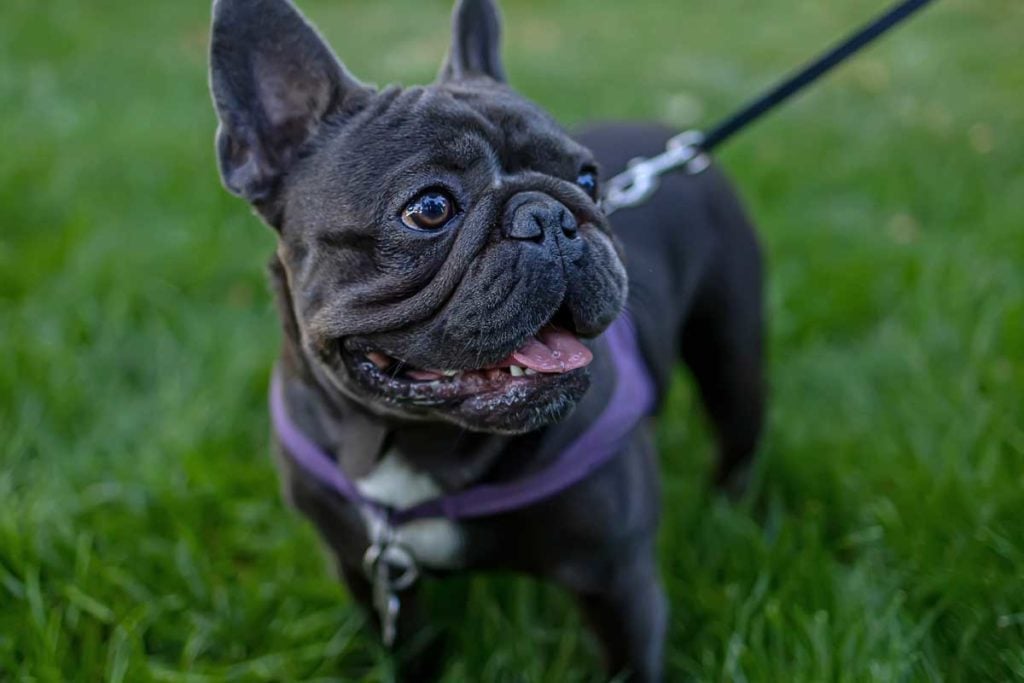Brachycephalic dog breeds, or those with shortened skulls, have experienced a notable rise in popularity in recent years. Recognized for their smooshed faces, many of these dogs unfortunately experience several major problems with respiration and temperature regulation, as well as issues with eyes, teeth, skin, and even reproduction. How did these breeds come to be, and what potential health issues should pet owners be aware of?
Table of contents
- What does brachycephalic mean?
- What health issues are these dogs prone to?
- Special considerations for smooshed snouts
- Welfare concerns
- How can ElleVet’s CBD + CBDA help with itchy skin?
- Bottom line on brachycephalic breeds
What does brachycephalic mean?
Canine brachycephaly is a condition created by humans, the result of years of selective breeding, notes researcher K.J. Ekenstedt. The development of the shortened skull likely originated from selective breeding for advantage in fighting, according to Ekenstedt. A short snout was considered to result in stronger jaws for biting. Now, people seem to gravitate toward the rounded cheeks, large heads, and bulging eyes of French Bulldogs, Pugs, Bulldogs, Boston Terriers, and Boxers simply because they are cute.
What health issues are these dogs prone to?
Brachycephalic dogs are predisposed to a number of serious, potentially life-threatening health issues as a direct result of their abnormal head shape. These complications can diminish a dog’s quality of life and be expensive for pet owners to address.
Brachycephalic Obstructive Airway Syndrome
The skeletal structure of brachycephalic dogs results in the compression of their air passages. Abnormal soft tissue in the respiratory tract restricts airflow, resulting in significant challenges in their ability to breathe. According to Premier Veterinary Hospital, hyperthermia, or overheating, is also common in dogs suffering from Brachycephalic Obstructive Airway Syndrome (BOAS), as they are unable to cool themselves efficiently. This can lead to overheating, heat stroke, and even death.
Dogs with BOAS often show signs of increased respiratory effort, chronic shortness of breath, exercise intolerance, and sleep apnea, as well as the tendency to overheat. While huffing and puffing, snuffling and snoring are considered by some dog parents as endearing, these symptoms can lead to low blood oxygen levels, collapse, and be potentially fatal.
According to Ekenstedt, the risk of BOAS increases significantly as the relative length of the muzzle decreases. Over time, dogs with this syndrome may develop other secondary problems, including inflammation of other structures in the airways, warns experts from VCA Animal Hospitals. In the long term, the increased effort associated with breathing can put an increased strain on the heart.
For some dogs, a veterinarian may recommend surgery to improve airflow. This intervention comes with its own unique challenges and risks for brachycephalic dogs, however (keep reading!).
Eyes
Brachycephalic dogs’ eyes, because they protrude from their face, look bigger than average dog eyes. This is misleading, however, as their eyes are normal size. Rather, the eye sockets in these dogs are too shallow, resulting in eyeballs that bulge outward. Protruding eyes are at higher risk of injuries and ocular disease. In fact, according to DVM360, corneal ulcers were three to four times more frequent in brachycephalic dogs. These dogs also have significantly higher prevalence of conjunctivitis and corneal trauma.
Dental
Short-snouted dogs manage—or, more appropriately, attempt—to fit the same number of teeth as normal dogs into a much smaller mouth. This often creates dental problems associated with overcrowding and rotation of teeth. Food and debris can easily get stuck between teeth and plaque is more likely to build up and cause decay and gum disease.
Unfortunately, experts from Premier Veterinary Hospital note that dental disease is particularly difficult to prevent in brachycephalic dogs. It is challenging to brush the teeth of these dogs because they need their mouths to breathe, and cleaning each tooth is difficult due to crowding. Extraction of teeth is very common in short-snouted dogs, but such procedures can be dangerous (read on to learn more).
Reproduction
The abnormal physical build of smooshed-faced dogs also leads to complications for reproduction, warns Dr. Rowena Packer from the Royal Veterinary College. Because the heads of bulldog and other brachycephalic puppies tend to be too large to pass through their mother’s birth canal, the delivery of a large number of these pups requires a caesarean section procedure. As with any invasive surgery, caesarean section is particularly dangerous for brachycephalic dogs (read on!).
Skin
The shortened muzzle of brachycephalic dogs creates folds of excessive skin around the muzzle, eyes, and ears. Dogs with lots of wrinkles are predisposed to skin problems, as deep folds retain moisture and provide an ideal environment for bacterial and fungal infections.
Skin infections can be irritating and itchy. Excessive scratching often leads to secondary skin issues like lesions, hot spots, infection, and hair loss.
Special considerations for smooshed snouts
Everyday care
These pups should avoid heat, humidity, excessive activity, excitement, and stress. They should also always have access to cool water, fans, and or air conditioning in warmer temperatures. While they are not good swimmers, careful monitoring in a plastic pool can cool them down in the summer.
Skin folds should be cleaned regularly to prevent infections and irritation that can lead to itching. It is also important to note that obesity exacerbates symptoms of BOAS, so these dogs should be monitored for healthy weight. They need very little exercise so care should be taken not to overexercise these breeds. They are happy with short outings and a lot of relaxation time.
Swimming
Swimming is a very dangerous activity for brachycephalic dogs and, in fact, the water should be avoided for these breeds. Between their smooshed snouts, barrel chests, dense builds, and heavy heads, these dogs have a hard time keeping their faces above water to breathe. The struggles of staying afloat can mean these dogs tire easily and are a serious drowning risk. Be sure to fence off pools and access to water, invest in a doggy life jacket, and closely supervise brachycephalic dogs around water.
Flying
Because brachycephalic dogs are particularly sensitive to heat, humidity, and breathing difficulties with exercise and stress, air travel can be dangerous. If flying with your dog, have your pup sit in a passenger seat with you to minimize the risk of a medical emergency.
Surgery
Anesthesia is particularly dangerous for brachycephalic breeds. Alicia Karas, a veterinary anesthesiologist at Tufts VETS, warns, “They demand that the depth of unconsciousness be just right. If they are too sleepy, they may not be able to breathe. If they aren’t sedated properly and get too freaked out, they will hyperventilate and not be able to breathe.” This makes any procedure that requires sedation, including BOAS intervention, tooth extraction, and caesarean section delivery, potentially fatal.
Welfare concerns
The rising popularity and ownership over the past decade of brachycephalic breeds has fueled growing concerns about health issues in these dogs, notes researcher D. G. O’Neill. Affected dogs may have little or almost no activity because they are entirely occupied with breathing. When it comes to efforts to improve BOAS, many dogs still experience airway restrictions and a compromised quality of life, even after surgical corrections.
In 2020, the Dutch Kennel Club became the first organization in the world to end registration for 12 brachycephalic breeds. Additionally, the reproduction of English bulldogs and Cavalier King Charles Spaniels is now banned in Norway, with courts ruling that it breaches existing animal welfare laws.
How can ElleVet’s CBD + CBDA help with itchy skin?
ElleVet’s CBD + CBDA is proven effective in providing dogs support for itchy skin. Results from a groundbreaking Pruritus study found that 65% of enrolled dogs, who had not previously responded to other commonly used products, had a significant improvement in skin itchiness after using ElleVet’s CBD + CBDA. This is great news for brachycephalic dogs!
If you are noticing excessive itching, ElleVet’s CBD + CBDA products can address this irritation and discomfort and offer skin health support, which is important for overall well-being and maintaining a good quality of life.
As always, consult your veterinarian about any issues your dog is experiencing. For any questions about ElleVet’s CBD + CBDA products or how CBD can help your canine friend live their best life, give us a call (844-673-7287) or send us an email ([email protected]). We are here to help.

Bottom line on brachycephalic breeds
Short-snouted dogs are undeniably adorable, but the physical features bred into their lineages cause many serious and potentially fatal health issues. If you are considering bringing a brachycephalic dog home, you should be aware of these health concerns and be prepared to help your pup have the best quality of life possible.
Any health or medical information in ElleVet blogs is from a variety of public and reputable sources. This information is intended as an educational resource only and is not a substitute for expert professional care.









